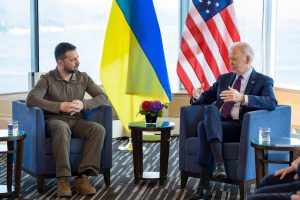“Supporting Ukraine’s ability to fight off Russian aggression and defend its sovereignty requires a worldwide commitment,” U.S. President Joe Biden declared in January 2023. The Biden administration sees the war in Ukraine as a challenge to the world order. When the U.S. refers to the “world order,” it is referring to the system of institutions and rules that have governed international relations since World War II – a system once characterized by the competition between the U.S. and the Soviet Union, and which the U.S. dominated for decades after 1991.
Much has changed in the past 80 years. The Cold War and the Soviet Union ended 30 years ago. China and India have become economic powerhouses. Developing economies and booming young populations in Africa, Asia, and South America mean that international relations is less and less about the ambitions of superpowers and more about groups of countries pursuing overlapping national interests together.
The war in Ukraine is the theater in which the United States and Europe are trying to assert their ability to continue setting the rules of the game. NATO allies want to keep Russia from expanding into Ukraine. They want to show Russia that if it tries to annex the territory of another country, there will be military and economic consequences. And they want to be the ones that decide what the rules of the game are going to be going forward.
The U.S. and its allies believe that they can supply Ukraine with enough weaponry to exhaust Russian military forces and materiel. Ukraine hopes that Western support intensifies enough and lasts long enough to push Russia out of the country. Russia believes that it can wait until the West is tired of supporting Ukraine and then move to control the country with a pro-Russian puppet government backed by Russian military might.
All sides are exhausted by this conflict. Many are wondering how long they can continue operating at this level of intensity. Wars end not because one side changes its goals, but because new information from the battlefield convinces one side that they will not accomplish their goals. Neither side is there yet.
In this context, the Ukrainians cannot be forced to renounce their goal of pushing Russia out of Ukrainian territory. At some point, a negotiated outcome will become preferable to ongoing war and its associated cost in life, limb, and living standards. It will be up to the Ukrainians to decide when they have reached that point. The Biden administration will support the Ukrainians as long as they continue fighting. Kyiv hopes, but cannot assume, that the next American administration will do the same.
China has tried to present itself as a peacemaker, but it is not doing much more to engender peace than the United States. By supporting Russia, an important partner, with trade and shared international clout, China allows Russia to believe that it can ultimately triumph in Ukraine. Ukraine cannot accept China as an objective party in this conflict, which means that other countries will have to step into the role of facilitating negotiations. Turkey has indicated that it may be willing to do this.
The war in Ukraine has put the United States and China on opposite sides of the conflict. The U.S. supports Ukraine; China supports Russia. The larger issue here, however, is about who will control the world order of the future. Will the U.S. and Europe continue to play an outsized role in setting global rules and organizations? Or will China, Russia, and other countries less convinced that the Western world order is in their interests win the day? This is the underlying conflict being played out in Ukraine.
In a series of articles, Chinese and American experts intend to make explicit the misperceptions that drive the mistrust in the ever-increasing instability in the bilateral relationship. Find the whole series here.

































